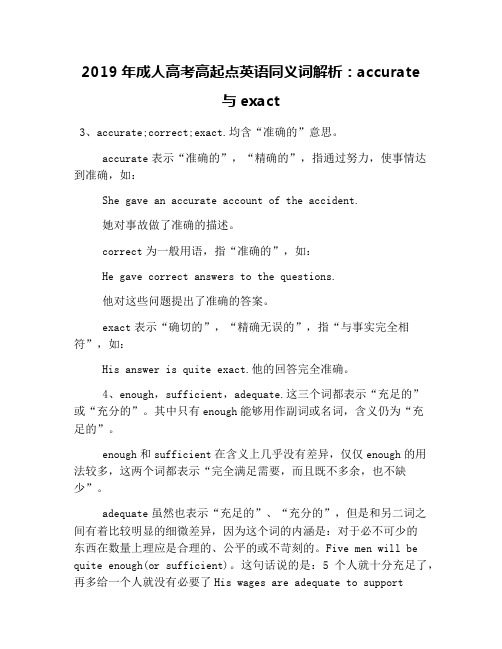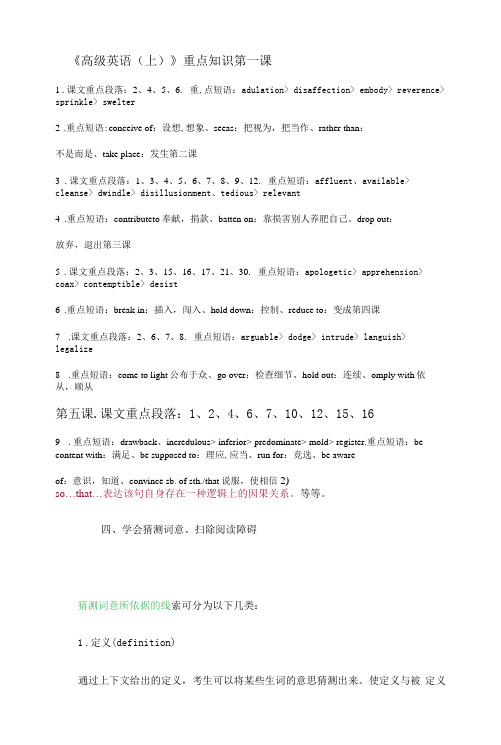Suffice的用法
高二英语科研项目实施困难重重单选题40题(带答案)

高二英语科研项目实施困难重重单选题40题(带答案)1.The research project faced many _____.A.obstaclesB.advantagesC.opportunitiesD.resources答案:A。
“obstacles”意为障碍;“advantages”意为优势;“opportunities”意为机会;“resources”意为资源。
根据题干“research project faced many”可知,科研项目面临很多的应该是障碍。
2.They had to overcome various _____ in implementing the project.A.challengesB.benefitsC.pleasuresD.hazards答案:A。
“challenges”意为挑战;“benefits”意为好处;“pleasures”意为快乐;“hazards”意为危险。
在实施项目中要克服的是各种挑战。
3.The lack of funds was a major _____.A.strengthB.weaknessC.powerD.force答案:B。
“strength”意为力量、优点;“weakness”意为弱点;“power”意为权力、力量;“force”意为武力、力量。
缺乏资金是一个主要的弱点。
4.The team encountered several _____ during the research.A.difficultiesB.easinessC.simplicitiesforts答案:A。
“difficulties”意为困难;“easiness”意为容易;“simplicities”意为简单;“comforts”意为舒适。
团队在研究中遇到的是困难。
5.The complexity of the problem was an obvious _____.A.advantageB.disadvantageC.optionD.alternative答案:B。
suf开头的单词

suf开头的单词1. Suffer- 单词释义:遭受(痛苦、疾病、损失等);忍受;经历。
- 单词用法:可作及物动词或不及物动词。
例如“Suffer pain”(遭受痛苦),“He suffers from a headache.”(他正遭受头痛之苦)。
- 近义词:endure(忍受,侧重长时间经受艰难困苦而不屈服)、tolerate(容忍,指以自我克制的态度对待令人反感或厌恶的东西)。
- 短语搭配:suffer from(患……病;受……之苦),suffer loss(遭受损失)。
- 双语例句:- I can't believe she has to suffer such a great pain. It's just like a dark cloud hovering over her all the time.(我不敢相信她得遭受这么大的痛苦。
就像一片乌云一直笼罩着她。
)- “Suffer? Why should I? I'm not going to let this setback bring me down!” he shouted angrily.(“遭受?我为什么要遭受?我不会让这个挫折把我打倒的!”他愤怒地喊道。
)- She suffered from loneliness after moving to a new city. It was as if she was in a deserted island all by herself.(搬到新城市后她饱受孤独之苦。
就好像她自己在一个荒岛上一样。
)- If you keep making mistakes like this, you will surely suffer consequences. Don't you realize that?(如果你继续这样犯错,你肯定会遭受后果的。
你难道没意识到吗?)- They suffered a great loss in the business. It felt like their dreams were shattered into pieces.(他们在生意上遭受了巨大的损失。
be型虚拟语气及倒装

be-型虚拟式的主要用法如下。
用于表示命令、决定、建议等词语之后的that-分句中be-型虚拟式的这一用法又有以下三种情况:a)用在decide, decree, demand,insist,moveorder,prefer,propose,recommend,request,require,suggest,vote等动词之后的that分句中。
例如:He ordered that all the books be sent at once、We propose that somebody neutral take the chair(担任主席)。
She insisted that she go to the south for her holiday、Congress has decided /voted/ decreed that the present law be maintained、The doctor insisted that he not eat meat、b)用在decision, decree, demand, Instruction, order, requirement, resolution等名词之后的that-分句中。
例如:The board(理事会) has given instructions that the agent fly to Boston、We were faced with the demand that this tax be abolished、Your advice that she wait till next week is reasonable、Their decision was that the school remain closed、His order that the troops not be sent at once was carried out、在这一用法中be-型虚拟式能与“should +不定式”交替使用,也能与不定式被动语态交替使用。
词根-快乐12-动作词根0:放,产生,做,用

放,产生,做,1. Pos, posit=put, 表示“放”pose v 做姿态compose v 组成;作曲;使镇定(com 一起+pose→放到一起→组成)composure n 镇静,沉着(com 一起+pos+ure→[精神]放到一起→镇静)depose v 免职;沉淀(de 去掉+pose 放,职位→去掉职位→放下去→沉淀)discompose v 使不安(dis 不+compose 不镇静→使不安)decompose v 分解dispose v 处理;排列(dis 分开→pose→分开[排好]→排列)disposed a 愿意的(听任处理→心甘情愿的)indisposed a 不愿意的(in 不+disposed 情愿的)expose v 暴露;揭露(ex 出+pose→放出来→暴露)impose v 强加;征税(im 进+pose→放进去→强加)juxtapose v 并列,并置(juxta 并排+pose→并排放)opposite a 相对的(op 对+pos+ite→放到对面→相对的)repose n 休息;睡眠(re 再+pose→再放下[工作]→休息)transpose v 互换位置(trans 转移+pose→[互相]移放)proposal n 建议,提议(pro 向前+pos+al→向前放→提建议)purpose n 目的,意图(pur 始终+pose→始终放的东西→目的)position n 立场(posit 本身是一个单词,意为“认为,肯定”)apposite a 适当的,得体的(ap 加强动作+posite→放到(合适的位置))apposition n 并置;同位(ap+posit+ion→放在[一起]→并置)composition n 作文;组合(com 一起+posit+ion→放到一起→组合→作文)composite n 合成物(com 一起+posite→放到一起→合成物)deposit v 储存 n. 矿藏(de 下面+posit→放下不用→储存)depositary n 贮藏所(deposit+ary)deposition n 免职;沉淀(见depose)disposition n 性情;安排(dis 分开→分开放→安排;引申为人的喜好,心情)exposition n 展览;解释(见expose)imposition n 征税;强加(见impose)repository n 仓库(re 重新+posit+ory→重新放东西之地→仓库)supposition n 推测,猜想(sup 在下面+posit+ion→放在下面的[想法]→推测)2.pon, pound= put, 表示“放置”component a 组成的n. 部分(com 共同+pon+ent→共同的放到一起→组成的)opponent v 对立的n. 对手(op 反+pon+ent→反着放→对立的)propone v 提议,提出(pro 向前+pone→[把意思]向前放→提议)proponent n 提议者(propone+ent)exponent n 讲解者(ex 出+pon+ent→把[内容]放出来→讲解)compound n 化合物(com 全部+pound 放→全部放到一起→化合物)postpone v 推迟(post 后+pone→向后放→推迟)expound v 详细说明(ex 出+pound→把[意义]说出来→详细说明)impound v 把…围住;扣押( im 进+pound→放进去→围住)propound v 提出,提议(pro 向前+pound→向前放→提出)3.thesis,thet= setting ,表示“放置”thesis n 论文;命题(放好的研究主题)antithesis n 对立(anti 反+thesis→反着放→对立)hypothesis n 假说;前提(hypo下面+thesis→放在下面,还不能作为正式理论)parenthesis n 括号(par 平行+en 进+thesis→平行放进去→括号)synthesis n 综合(syn 共同+thesis→放到一起→综合)antithetical a 对立的(anti 反+thet 放+ical→反着放→对立)synthetic a 综合的(syn 共同+thet+ic 放→放一起)4.stitut,stit=set up ,place,表示”建立,放"constitute v 构成;制定(con 一起+stitute→放到一起→构成)constitution a 构成:宪法(constitute+ion)constituent a 组成的(con+stitu+ent)reconstitute a 重新制定;泡水还原(re 重新+constitute 构成)destitute a 缺乏的;贫穷的(de 没有+stitute→没有建立→缺乏的)destitution n 缺乏;穷困institute n 学会;学院 v.制定,设立(in 进入+stiute→建立进去→设立)institution n 制度;惯例(设立出的制度)prostitute n 妓女(pro 前面+stitute→放[站]在[路]前的prostitution n 卖淫substitute n 替代人员 v.代替(sub 下面+stitute→在下面放着→代替)superstition n 迷信(super 超过+stit+ion→放在[人理智]之上→迷信)superstitious a 迷信的restitute a 偿还,赔偿(re 回+stitute→放回去→偿还)restitution n 赔偿,偿还5.struct=build,表示“建立”reconstruct v 重建(re 重新+construct→重新建造)destructible a 易毁坏的(de 坏+struct+idle→把建造的东西弄坏→损坏的)destructive a 有破坏力的(de+struct+ion)instruct n 指导,教导(in 进+struct→[把知识]建立进去→指导)instruction n 教导,指导(in+struct+ion)instructor n 教师,讲师obstruct v 妨碍(ob 反+struct→反建设→妨碍)obstruction n 阻碍;闭塞substruction n 下部结构;基础(sub 下面+struct+ion→下面的建设→基础)substructure n 基础信仰,基础,下层建筑superstructure n 上层建筑(super 上面+structure→上面的结构→上层建筑)instrumental a 有帮助的;工具的(instrument 工具+al)instrumentality n 手段,媒介(imstrument工具+aliy性质→作为工具用→手段)6.gen,gener,genit=birth,produce,表示“出生,产生”generalization n 一般化(general+ization)regenerate v 再生,重生(re 再+generate)degenerate v 堕落;衰退(de 坏+gener+ate→往坏产生→堕落)degenerative a 退化的;变坏的(degenerate+ive)genesis n 起源,创始(gen+esis 名词后缀,原指《圣经》中的创世纪)genetic a 基因的,遗传学的(gen+etic→来自gene 基因)genus n 种类,类属(gen+us→生出来就出现[不同]→种类)generic a "科属的(gen+eric,来自genus 种类)"genuine a 真正的,纯正的(genu+ine→产生→来源清楚→真正的)ingenuous a 天真的;老实的(in 内+genu+ous 产生自内心→天真的)genius n 天才(geni+us→生出[就有]→天才)ingenious a 聪明的;有创造力的( in 内+geni+ous 自内心产生→聪明的)eugenics n 优生学(eu 好+gen+ics→产生好的→优生学)pathogeny n 病原学(patho 病+geny→产生病→病原学)congenial a 意气相投的(con 共同+gen+ial→产生共同[兴趣]→情投意合的)congenital a 天生的,与生俱来的(con 共同+gen+ital→与生俱来→天生的)primogenitor n 始祖,祖先(primo 最初+genit+or→最初产生的人→祖先)progeny n 子孙,后代(pro 向前+geny→向前产生→生命向前→子孙)genial a 和蔼的;愉快的(gen+ial→产生[感情]的→和蔼的)indigenous a 土产的,土著的(indi 内部+gen+ous→内部产生→土产的)heterogeneous a 不同的(hetero 异+gen+eous→产生不同的)homogeneous a 同种的(homo 同+gen+eous→产生相同的)genre n 类型;流派(通常指文学等类型)genteel a 高雅的;有礼貌的(gent+eel→出身好的,gentle“温柔的”变体)engender v 产生(en 使+gender 产生→使产生)7.gest,gister=carry,bring,表示“带来,产生”gesture n 姿势;手势(gest+ure→带来信息的动作→手势)gesticulate v 做手势(gest[=gesture]+iculate 表动作)congest v 充满,拥挤(con 共同+gest→带到一起→拥挤)copngestion n 拥挤,稠密(congest+ion)ingest v 摄入咽下digest v 消化;摘要(di 分开+gest→分开带→[把营养]带到身体→消化)digestion n 消化(digest+ion)indigestion n 消化不良(in 不+digestion 消化)suggest v 提议,建议(sug 在下面+gest→从下面带上来→建议)suggestion n 建议;暗示(suggest+ion)register v/n 登记,注册(re 再次+gister→再次带来→[学员]注册,登记)registration n 记录,注册(register+ation=registration)8.cre,creas=grow,make,表示“增长,产生”creature n 生物;创造物(create+ure→创造物,生物)decrease v 减少(de 向下+crease 增长→向下增加→减少)decrement n 减少(decrease 的名词)increase v 增加(in 向内+crease 向内增→增加)increment n 增加(increase 的名词)procreate v 繁殖;生产(pro 向前+create 创造→不断创造→繁殖)procreative a 有生殖力的(procreate+ive)recreate v 休养;再造(re 再+create→再创造→休养[再创能量])recreation n 娱乐,消遣(recreate+ion)crescent n 新月a.新月状的(cre +escent 开始…的→开始增大→新月)decrescent a 渐小的;(月)下弦的(de向下+crescent→向下的月亮→下弦月)concrete a 具体的n.混凝土(con 共同+crete[=cre 制造]→共同制造→混凝土)concretion n 凝结;结石(concrete+ion)9. act=to do , to drive,表示“行动,做”actualize 实现(actual 实际的+ize 化→实际化→实现)counteract 抵抗;抵消(counter 反+act→反着动→力量对抗→抵消)enact 实施,颁布(en+act→使〔法律〕动→实施法律)exacting 苛求的(exact+ing)react 反应;反抗(re 反+act→反动;反应)transact 做交易;办理(trans 横+act→横向动→互相贸易或交易)10. ag=do, act, 表示“做,代理做”agenda 议事日程(ag+enda 表示复数→做的事情→议程)agile 灵活的,敏捷的(ag+ile 能…的→能做的→灵活的)agitate 鼓动;搅动(ag+itate 表动作→反复作→鼓动)agitation 鼓动,煽动(agitate+ion)agitator 鼓动者(agitate+or 人→鼓动的人)agitating 使人不安的(agitate+ing)coagent 合作者(co 共同+agent→共同做的人)counteragent 反作用剂;反抗力(counter+agent作用因素→反作用→反抗力)reagent 反应力;试剂(re 再+agent作用→再次作用→反应,引申为化学试剂)11.fac,fact,fect,fic,fig=make,do,表示“做,制作”facilitate v 使容易(fac+ilitale 能够→使能够做→使容易)facsimile n 复写,传真(fac+simile 相同→做出相同的东西→传真)faction n 宗派,小集团(fact+ion→[一帮人]做→小集团)factious a 搞派别的(faction 的形容词)factitious a 人为的,不自然的(fact +itious…的→做出来的,不自然的)affect v 影响;感动(af 使+fect→使人做→影响)affected a 受感动的;假装的(affect 影响+ed→被影响的→被感动的)affection n 感情;友情(affect+ion→感动→感情)affectation n 假装(affect+ation→做出的感动→假装)affectionate a 充满感情的(affection 感情+ate)affective a 令人感动的( affect 感动+ive 表示主动的形容词→令人感动的)confection n 糖果(con 共同+fect+ion→混在一起→糖果)confectionery n 糖果店(confection 糖果+ery→糖果店)defect n 缺点,缺陷;变节(de 坏+fect→做坏了→缺陷)defection n 叛党,变节(de 坏+fect→做坏事→叛党)disaffect a 使…感情疏远;不满(dis 分开+affect 感情→感情分开→疏远)disaffected a 不满的;背离的(disaffect+ed)effect v 实施;生效;效果(ef 出+fect→做出来→生效;效果)effective v 有效的(effect +ive)effectuate v 使…有效(effect+uate 表示动词)infect v 传染;感化(in 进入+fact→做进去→传染进去)infection n 传染;感化(infect+ion)infectious a 传染性的(infect+ious)perfect a 完美的;完全的(per 全部+fect→全部做完→完美的)efficacy n 功效,功能(ef 出+fic+acy→做出来的结果→功效)efficacious a 有效应的(efficacy.y 变成I,再加ous)efficient a (做事)有效的(ef 出+fic+ent→能做出事来→有效率的)proficient a 精通的,熟练的(pro 前+fic+ient→以前做过→熟练的)proficiency n 精通,熟练(pro+fic+inecy)suffice v 使满足,充足(suf 在下面+fice→在下面先做好→充足)sufficient a 足够的,充分的(suffice+inet)fictitious a 虚构的(fict+itious)feat n 功绩,事业(feat=fact 做大事→功绩)feature n 面貌;特征(feat+ure→做事的状态→做事特征)feasible a 可行的;可能的(feas 做+ible→能够做的→可行的)malfeasance n 不法行为(mal 坏+feas+ance→做坏事)defeat v 打败,摧毁(de 向下+feat→做下去→打下去)defeatism n 失败主义(defeat +ism)figment n 虚构的事物(fig+ment→做出的东西→虚构)transfigure v 使变形;使改观(trans 改变+figure 形状)configuration n 结构;形状;配置(con 共同+figure形象+ion→形象放在一起)12. us,ut = use,表示“用”usage n 用法;惯例(us+age 状态→用的状态→用法)unusual a 异常的(un 不+usual 通常的)abuse v 滥用,谩骂(ab 坏+use→不好用→滥用)abusive a 谩骂的(abuse+ive)disabuse v 纠正…错误(dis 去掉+abuse 滥用→去掉滥用→纠正错误)disuse v 废弃不用(dis 不+use→不用了)misuse v 错用;虐待(mis 坏+use→用坏→错用)utilize v 利用(ut+ilize)utility n 公用事业;有用(ut+ility)utilitarian a 功利主义的(utility+arian……的→有用为主→公里主义)utensil n 用具,器血(ut 用+ensil 表物品→用具)usurp v 篡夺;侵占(us+urp[=rape 枪掠]→枪过来用→篡夺)13. treat=handle,表示“处理”treatment n 待遇;治疗(treat+ment)treaty n 条约;约定(treat+y→作出处理的文件→条约)maltreat v 虐待(mal 坏+treat)retreat n 退却;隐退(re 回+treat→处理回去→退回去→隐退)entreat v 恳求,请求(en 使+treat→使……得到处理→请求)entreaty n 恳求,请求。
成考高起点英语同义词解析:accurate与exact

2013 年成考高起点英语同义词解析,有关 accurate 与 exact 的区别, 3、accurate;correct;exact.均含“正确的”意思。
accurate 表示“准确的”,“精确的”,指通过努力,使事情达到正确,如:
She gave an accurate account of the accident.
她对事故做了准确的描述。
correct 为一般用语,指“正确的”,如:
He gave correct answers to the questions.
他对这些问题提出了正确的答案。
在医院门诊部就医的大多数病人认为,如果他们不能带一些实实在在的药 物,如一瓶药水、一盒药丸、一小瓶药膏回家的话,他们就没得到充分的治 疗……
enough 和 sufficient 在含义上几乎没有差异,只是 enough 的用法较多,这 两个词都表示“完全满足需要,而且既不多余,也不缺少”。
adequate 虽然也表示“足够的”、“充分的”,但是和另二词之间有着比较明显 的细微差异,因为这个词的内涵是:对于必不可少的东西在数量上应当是合 理的、公平的或不苛刻的。Five men will be quite enough(or sufficient)。这句 话说的是:5 个人就十分充足了,再多给一个人就没有必要了 His wages are adequate to support three people.这句话说的是:他的工资够养活 3 个人的。即 这些钱养活 3 个人够得上一般生活水平,并不苛刻。可见其差异非常细微。 词义差别越细微,表意越准确。例如:“我为他干了 3 小时的活,他付给我 20 英镑。我觉得那 20 英镑的工钱是足够了的”。这两句话在英译时,其中的 “足够的”必须用 adequate,因为这里说的“足够”包含了“公平、合理”的意思。 故这两句可译为:I worked for him three hours,and he paid me 20 pounds.I think the 20 pounds are adequate for my work.此外,应注意下面例句中 enough
2019年成人高考高起点英语同义词解析:accurate与exact

2019年成人高考高起点英语同义词解析:accurate与exact3、accurate;correct;exact.均含“准确的”意思。
accurate表示“准确的”,“精确的”,指通过努力,使事情达到准确,如:She gave an accurate account of the accident.她对事故做了准确的描述。
correct为一般用语,指“准确的”,如:He gave correct answers to the questions.他对这些问题提出了准确的答案。
exact表示“确切的”,“精确无误的”,指“与事实完全相符”,如:His answer is quite exact.他的回答完全准确。
4、enough,sufficient,adequate.这三个词都表示“充足的”或“充分的”。
其中只有enough能够用作副词或名词,含义仍为“充足的”。
enough和sufficient在含义上几乎没有差异,仅仅enough的用法较多,这两个词都表示“完全满足需要,而且既不多余,也不缺少”。
adequate虽然也表示“充足的”、“充分的”,但是和另二词之间有着比较明显的细微差异,因为这个词的内涵是:对于必不可少的东西在数量上理应是合理的、公平的或不苛刻的。
Five men will be quite enough(or sufficient)。
这句话说的是:5个人就十分充足了,再多给一个人就没有必要了His wages are adequate to supportthree people.这句话说的是:他的工资够养活3个人的。
即这些钱养活3个人够得上一般生活水平,并不苛刻。
可见其差异非常细微。
词义差别越细微,表意越准确。
例如:“我为他干了3小时的活,他付给我20英镑。
我觉得那20英镑的工钱是充足了的”。
这两句话在英译时,其中的“充足的”必须用adequate,因为这里说的“充足”包含了“公平、合理”的意思。
英国人最不能忍的50句美式英语

【美式英语 Or 英式英语】英国人最不能忍的50句美式英语美式英语入侵英国,BBC网站曾发表过一篇文章,引起了很多英国人的共鸣。
英国读者纷纷吐槽,列举最不能忍的美式英语表达。
1. When people ask for something, I often hear: "Can I get a..." It infuriates me. It's not New York. It's not the 90s. You're not in Central Perk with the rest of the Friends. Really."当某些人想要什么东西时,我经常听到他们说:“Can I get a...(我能要一个……)”这让我大为恼火。
这里又不是纽约,又不是90年代,你以为你是在Central Perk里演《老友记》啊,真是的!2. The next time someone tells you something is the "least worst option", tell them that their most best option is learning grammar.下次要是有人跟你讲XXX是the “least worst option”(最好选择),你就告诉他们对于他们来说最最最好的选择是滚回去学语法。
3. The phrase I've watched seep into the language (especially with broadcasters) is "two-time" and "three-time". Have the words double, triple etc, been totally lost? Grammatically it makes no sense, and is even worse when spoken. My pulse rises every time I hear or see it. Which is not healthy as it's almost every day now. Argh!我经历过的渐渐渗入到英语里的短语(特别是播音员使用的)是“two-time(两次)”和“three -time(三次)"。
2023年自考高级英语重点

《高级英语(上)》重点知识第一课1.课文重点段落:2、4、5、6. 重,点短语:adulation> disaffection> embody> reverence> sprinkle> swelter2.重点短语:conceive of:设想,想象、seeas:把视为,把当作、rather than:不是而是、take place:发生第二课3.课文重点段落:1、3、4、5、6、7、8、9、12. 重点短语:affluent、available> cleanse> dwindle> disillusionment、tedious> relevant4.重点短语:contributeto奉献,捐款、batten on:靠损害别人养肥自己、drop out:放弃,退出第三课5.课文重点段落:2、3、15、16、17、21、30. 重点短语:apologetic> apprehension> coax> contemptible> desist6.重点短语:break in:插入,闯入、hold down:控制、reduce to:变成第四课7.课文重点段落:2、6、7、8. 重点短语:arguable> dodge> intrude> languish>legalize8.重点短语:come to light公布于众、go over:检查细节、hold out:连续、omply with依从,顺从第五课.课文重点段落:1、2、4、6、7、10、12、15、169. 重点短语:drawback、incredulous> inferior> predominate> mold> register.重点短语:be content with:满足、be supposed to:理应,应当、run for:竞选、be awareof:意识,知道、convince sb. of sth./that说服,使相信2)so…that…表达该句自身存在一种逻辑上的因果关系。
- 1、下载文档前请自行甄别文档内容的完整性,平台不提供额外的编辑、内容补充、找答案等附加服务。
- 2、"仅部分预览"的文档,不可在线预览部分如存在完整性等问题,可反馈申请退款(可完整预览的文档不适用该条件!)。
- 3、如文档侵犯您的权益,请联系客服反馈,我们会尽快为您处理(人工客服工作时间:9:00-18:30)。
Suffice的用法Suffice:(verb),(not used in the progressive tense不用于进行时),to be enough for sb/sth 足够,足以;~to do sth。
注:to 后面接动词。
对电压及电流只要一个箭头就够了。
例:一:Generally a brief note or a phone call will suffice 通常写个便条或打个电话就足够了。
二:One example will suffice to illustrate the point .
举个例子就足以说明这一点
三:The single items will suffice to typify all the rest.
即此一端,可概全余。
Add :一:suffice (it) to say (that)…: although you could say more , what you do say will be enough to explain what you mean 无需多说,只需说…就够了。
例:
二:Suffice for …:suffice for 后面加名词例:Two bottles of wine will suffice for lunch.
午餐有两瓶葡萄酒就够了。
So that one arrow will suffice for both voltage
and current.
对电压及电流只要一个箭头就够了。
